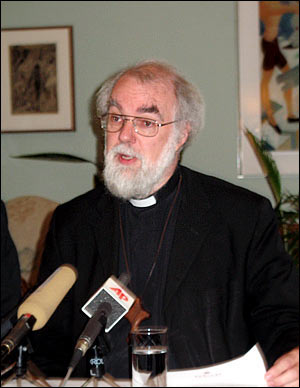| Tools: Save | Print | E-mail | Most Read |
| Archbishop of Canterbury Concludes China Tour |
| Adjust font size: |
Speaking at a press conference in Beijing on Monday to mark the end of his China visit (Oct 8-23), the Archbishop of Canterbury, Dr. Rowan Williams, said that his two-week visit gave him a better understanding of China's Christian communities, and paved the way for a deeper study into how the Church of England and the church in China could build a more solid relationship. The tour, organized by the senior leadership of the Post-denominational Protestant Churches in China and hosted jointly by the Three Self Patriotic Movement/China Christian Council, and the State Administration of Religious Affairs (SARA), took Williams to Shanghai, Nanjing, Wuhan, and Xi'an before ending in Beijing. Addressing the media at the British Embassy in Beijing, Williams said: "Our original aims of this visit were to get a better understanding of the situation of the Christian communities in China and to explore how we might build deeper relations between the Church of England and the Three Self Patriotic Movement/China Christian Council here, especially in regard to cooperation in the training of theologians. And I believe we have fulfilled these aims and now we can go on to developing specific ways to share skills as we have discussed."
The Archbishop's key concerns during the visit related to the church in China and its changing context, the challenges posed by development and accelerated economic activity, the environmental agenda in the region, and the debate about constructing a "harmonious society" in China and how religion might contribute to this process. Commenting on the general situation of churches in China, Williams said: "I have to say that this visit has exceeded our hopes and expectations." He said he was very impressed with the large congregations attending Sunday services in some parts of China. What also caught his attention was the increasing number of church-backed welfare projects being launched, particularly those to do with childcare, rural healthcare, and migrant workers. He highlighted the Chinese government's willingness to support many of these projects. Responding to a question on the possibility of future dialogue between leaders of the major religions, including Christianity, Williams said: "One of the very interesting observations I made here is that cooperation comes before dialogue." During his visit, Williams met with several religious leaders, academics, local officials, and non-governmental organizations and business leaders. He also visited many church-related institutions and initiatives. In addition, he also took part in debates held at a number of academic institutions. In Beijing, the Archbishop met with representatives from government, the SARA and the State Administration Of Environmental Protection. Delivering a speech in Nanjing on October 10, Williams said that China has immense potential in helping to solve the world's problems because it is emerging as a senior partner in the fellowship of nations. He emphasized that China had its place in a future that will require nations to work together more than ever. China's policy of religious freedom has been carried out soundly since it implemented reform and opening-up in 1978. China's Christian community has deep relations with its counterpart in Britain, according to China's top advisor Jia Qinglin, chairman of the National Committee of the Chinese People's Political Consultative Conference, in a meeting with Williams. He said China has committed itself to building a harmonious society, and religion can play an important role in that process. He added that China will continue to support the Christian faith in China by furthering exchange and cooperation with churches around the world. (China.org.cn by staff reporter Wang Qian, October 23, 2006)
|
| Tools: Save | Print | E-mail | Most Read |
 |
| Related Stories |
| Product Directory China Search |
Country Search Hot Buys |
